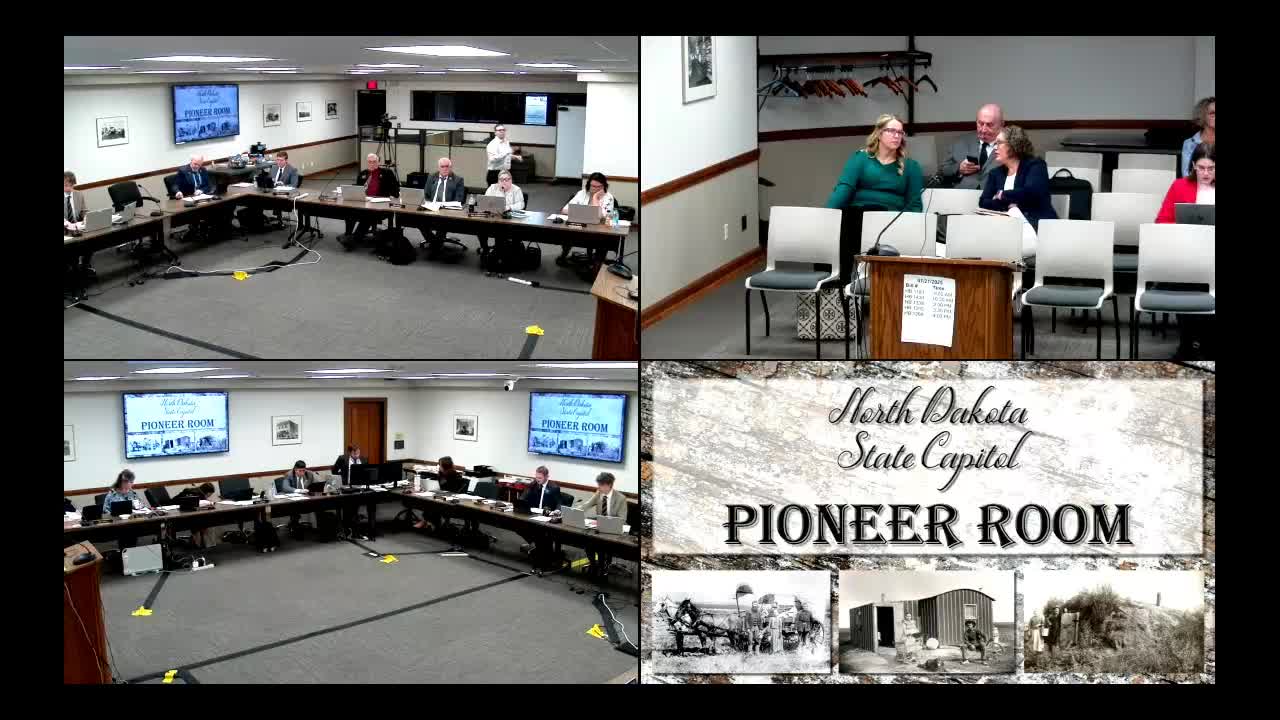Hearing on bill to allow non‑affirming counseling divides social-work community
Get AI-powered insights, summaries, and transcripts
Subscribe
Summary
Representative Lori Van Winkle told the House Human Services Committee that House Bill 1430 would allow licensed social workers to offer counseling that "aligns with heterosexuality or the individual's biological sex" when requested by a client, reversing an administrative‑rule prohibition.
Representative Lori Van Winkle told the House Human Services Committee that House Bill 1430 would restore options for clients and remove what she described as an administrative rule that prevents licensed social workers from offering counseling that aligns with a client's religious or traditional beliefs about sexual orientation or gender. Van Winkle identified the rule as "75.5-02-06.1.01" and said the change was necessary so therapists and clients could choose among available treatments.
Van Winkle said the June 2021 administrative rule change made it "an ethical violation for a social worker licensed by the board to engage in any practices or treatment that attempt to change or repair the sexual orientation or gender identity of lesbian, gay, bisexual, transgender, and questioning individuals," and argued that licensed providers should be allowed to use "all the tools in their tool belt" when a client requests them.
Supporters who spoke at the hearing said the bill protects client choice and clinicians' freedom to offer treatments aligned with clients' beliefs. Mary Shelke, a Bismarck resident, said the current rule "steers patients in a certain direction" and urged a due-pass recommendation. Several other residents voiced similar support.
Opponents — including clinicians, the North Dakota Board of Social Work Examiners and the North Dakota chapter of the National Association of Social Workers (NASW) — said the bill would permit practices identified by professional organizations as harmful. Elizabeth Anderson, a licensed professional clinical counselor, testified the "overwhelming consensus of professional organizations is that the types of therapy that promise a transition to heterosexuality or the individual's biological sex are not effective and cause more harm than healing." Jennifer Beckel, chair of the North Dakota Board of Social Work Examiners, told the committee the board had researched professional positions and recommended that conversion‑therapy practices be treated as unethical; she said 23 states and the District of Columbia have banned conversion therapy and urged a do‑not‑pass recommendation on HB 1430.
The testimony produced repeated questions from committee members about definitions, evidence and enforcement. Representative Dovervich and others asked whether there are peer‑reviewed, evidence‑based curricula or certification standards for the counseling approaches proponents described; proponents said licensed providers offering requested services exist in North Dakota but did not identify a standardized training curriculum or a widely accepted, peer‑reviewed modality. Board representatives and NASW lobbyists argued that those practices are not evidence‑based and that professional codes of ethics — including the NASW and American Counseling Association codes — bar providers from recommending or referring clients to conversion therapy.
Terry Efforts, the board administrator for the social work examiners, flagged practical enforcement and interstate-licensure questions: she asked the committee to check whether the proposed language would conflict with the social‑work licensure compact (House Bill 1035) and warned that complaint processing could be difficult given vague informed‑consent and documentation provisions in the current draft.
Several witnesses discussed risk and self‑determination. Proponents framed the bill as restoring self‑determination and options for clients; opponents said the reported harms — including increased rates of depression, anxiety and suicidality tied to conversion‑therapy practices — and the lack of evidence for safe, effective change‑effort treatments argue against allowing those practices. Committee members asked for peer‑reviewed citations and evidence; clinicians who testified said they would provide that material for the record.
The committee closed the hearing on House Bill 1430 after hearing multiple in‑person and written statements and recessed. No committee vote was recorded during the hearing; members and witnesses said they would seek clarifying language on definitions, enforcement, training standards and potential conflicts with interstate licensure.
